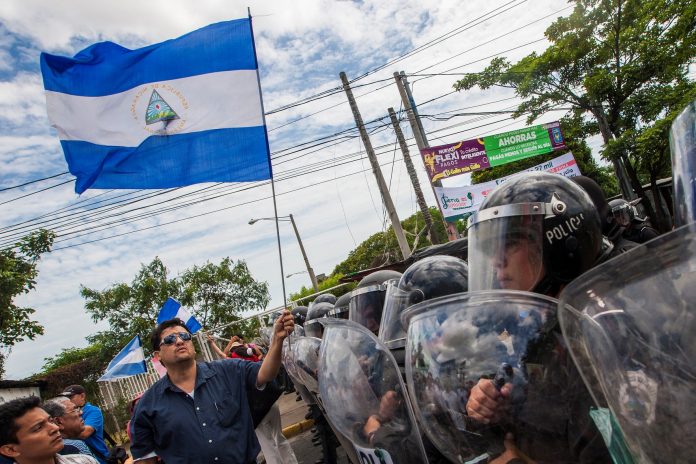Nicaragua’s increasingly authoritarian regime under President Daniel Ortega has been condemned by Human Rights Watch and prominent members of Latin America’s left.
Ortega has stepped up his attack on political opponents by raiding some the country’s most important non-governmental organisations and media.
Last week, armed police have seized the headquarters of one of Nicaragua’s top independent media outlets, Confidencial, and its leading human rights group, CENIDH, in the latest phase of a crackdown designed to cement Ortega’s grip on power after months of protests.
What is more, pro-Ortega lawmakers last week stripped nine NGOs of their legal status, with the government claiming the groups had “actively participated” in terrorist acts, hate crimes and a failed coup attempt against Ortega’s Sandinista regime.
As reported by the Guardian, José Miguel Vivanco, Human Rights Watch’s Americas director, said that by attacking such well-known organisations Nicaragua’s president was making clear his intention “to rule by terror and intimidation”.
He said: “This is a deliberate decision by Ortega to stay in power through brutal repression. There is no more facade of negotiation, or of a democratic regime … The policy being imposed … is zero tolerance to criticism.” Shutting down such groups was “something we haven’t even seen in Venezuela under Nicolás Maduro”.
The United Nation’s human rights chief, former Chilean president Michelle Bachelet, urged Ortega to “immediately halt the persecution of human rights defenders, civil society organisations [and] journalists and news organisations that are critical of the government”.
In an editorial, the opposition newspaper La Prensa slammed Ortega’s “massacre” of civil society. “Deep down what this is all about is that the dictatorship does not tolerate the existence of civil groups who nourish and strengthen democracy and denounce the abuse of power. That is why it is trying to liquidate them.”
According to the Guardian, the ratcheting up of repression has been accompanied by growing pushback from the US.
In November the US national security adviser, John Bolton, branded Nicaragua part of a Latin American “troika of terror” alongside Venezuela and Cuba. The Trump administration would “no longer appease dictators and despots near our shores”, Bolton vowed.
Weeks later the treasury department hit Ortega’s vice-president and wife, Rosario Murillo, with sanctions it called a response to their regime’s “rampant corruption, dismantling of democratic institutions [and] serious human rights abuses”.
In a statement, the European Union stressed that Brussels supports the ongoing work of the Inter-American Commission on Human Rights, notably the Follow-Up Mechanism on Nicaragua (MESENI) and the Interdisciplinary Group of Independent Experts (GIEI). “We expect the authorities to accept the return of the mission of the Office of the High Commissioner for Human Rights for the United Nations to Nicaragua.”
The EU called for a meaningful national dialogue with a view to identify a peaceful path out of the ongoing political crisis is essential. “Only accountability, dialogue and genuine political reforms leading to free and fair elections will allow for national reconciliation.”

